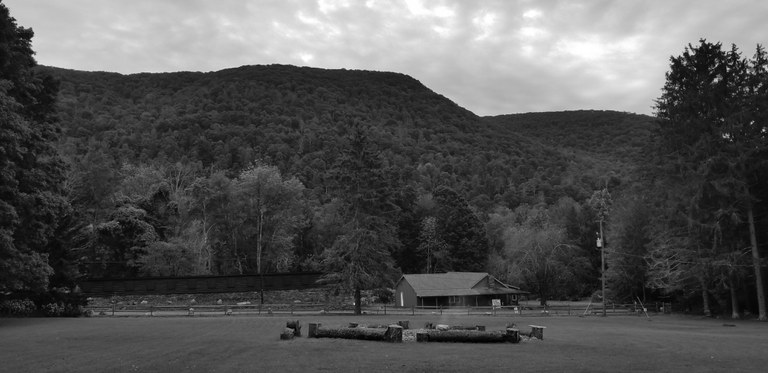Posted: January 14, 2020
America’s history through the lens of landscape is easy to read in Pennsylvania. Just wander the 110 acres owned by Monte Kapec near Jamison City and you’ll see how the nation’s priorities shifted in the last century.
"The thing that comes to mind is how far we've come," says Monte Kapec, The Camp at Elk Tannery owner. "It's not abandoned anymore. We've turned the corner on that."
The Camp at Elk Tannery was an industrial plot in the late 1800s, stimulated by the lumber boom. Trains rolled through the hardwood hills, initially transporting people and materials to what became a thriving community. A tannery moved in on the heels of an adjacent sawmill around 1889.
Trees fell and more than a century has passed by. Today, remnants of infrastructure from these operations still stand in the form of a hide house and smokestack. So does the superintendent's house, but it needed major improvements to avoid condemnation when Kapec took over.
"If we were going to keep the property, we were going to do it right," Kapec says. "There were prolific nonnative plants, but we wanted to put it to good use and share it."
Kapec's grandfather originally bought the land in the 1930s for somewhere to hunt. After he died, Kapec shared ownership with his family. With no one officially tending the land for decades, he saw the place slipping severely by 2012 so he decided to save it by buying everyone out and planting trees.
"When I took on this property, I learned a lot about family and forest legacy," Kapec says. "I didn't realize the struggle of transferring family ownership or how poor decisions made years ago can have such long-lasting consequences. People take the easy way out when harvesting trees or using land. They don't really think about the impacts, my family included. We neglected the health of the forest."
Now Kapec is prioritizing forest health and watching the woods respond to rehabilitation efforts. With support from the Sierra Club, Rocky Mountain Elk Foundation and Veterans of Foreign Wars, Kapec is turning a rundown tannery and sawmill into a certified tree farm.
"It's not just a certificate on the wall," Kapec says. "It helps us outline what we've done and what we're going to do. It's part of a recognition process with repeated assessments as you continue to improve."
Kapec commissioned a comprehensive inventory and assessment of the maple resources within the property leading him to invest in construction of a sugar shack for anticipated syrup production in the coming years. He has performed enrichment plantings in understocked portions of his woods, focusing on diverse hardwoods seedlings, but restoration isn't all about addition. Subtraction has its place too.
Invasive Japanese barberry was eventually tamed after repeat treatment efforts and quite a few trees removed to open the canopy for the benefit of golden-winged warblers. The small songbird forages on forest floors. Letting more sunlight reach that floor promotes plant growth. More growth gives ground-nesting warblers more cover when living low in the woods.
"Not everyone we work with is interested in cutting part of their forest down, but I see Monte as a progressive landowner," says Chad Spencer, Natural Resources Conservation Service soil conservationist. "He's always looking to see what he can do to improve the property."
With the woods returning, Kapec launched his next initiative, this one for soldiers. Kapec is a military veteran. He retired from Army medicine in 2019. He finds renewal in the camp's woods and he's sharing that natural connection with other vets.
"If there's a collective effort to improve, it has to include educating people," Kapec says. "I saw an opportunity to help others, so I picked up the baton. Spending time in forest helps people look at life a bit differently."
The renovated superintendent's house hosts fellowship dinners welcoming veterans and at-risk youth to the property for retreats. There are two new sleep cabins housing 15-20 guests each and a new activity center complimenting the arrangement, which includes nature walks, archery, fishing and foraging.
"We embrace them and encourage them to relax," Kapec says. "The setting itself is relaxing. It has an appeal you just can't deny. It's some form of therapy in itself."
It's a therapeutic place filled with new life. Warblers are hanging around and trees are growing up. Eventually there will even be maple syrup, the sweetest reckoning in Camp Elk's hard history of sour times coming full circle for the sake of the trees.
"We need to continue to grow and do good things," Kapec says. "It's not for me or just for the camp. What stands out to me is the opportunity to expose people to improving their well-being. This property is shaping lives."
Outdoor journalist Kris Millgate is based in Idaho where she runs trail and chases trout. Sometimes she even catches them when she doesn't have a camera, or a kid, on her back. Her first book 'My Place Among Men' is available now. See more of her work at www.tightlinemedia.com
James C. Finley Center for Private Forests
Address
416 Forest Resources BuildingUniversity Park, PA 16802
- Email PrivateForests@psu.edu
- Office 814-863-0401
- Fax 814-865-6275
James C. Finley Center for Private Forests
Address
416 Forest Resources BuildingUniversity Park, PA 16802
- Email PrivateForests@psu.edu
- Office 814-863-0401
- Fax 814-865-6275


